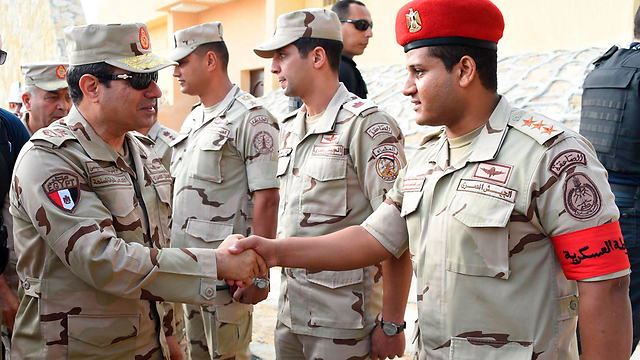Abdel Fattah al-Sisi’s crackdown in Sinai risks more instability in Egypt
Reuters/Ynetnews/Published: 07.11.15/Israel News
Despite the lessons of the past, Egyptian President Abdel Fattah al-Sisi is relying on fighter planes, mass arrests and death sentences to battle Islamist militants in a crackdown that could in fact prolong instability in the Sinai; unlike former President Hosni Mubarak, whose more subtle approach induced even his most diehard militant opponents to opt for a truce in the 1990s. He has moved relentlessly against the Islamists since orchestrating a military takeover that toppled President Mohammed Morsi of the now outlawed Muslim Brotherhood in 2013.
Yet Sinai-based insurgents affiliated with Islamic State, angered by Sisi’s campaign, are carrying out brazen attacks on security forces that have opened a dangerous new chapter in the decades-old struggle between the Egyptian state and Islamists. And signs are growing that Sisi’s constant squeeze on the Brotherhood has encouraged some of the movement’s youth to take up arms against the state, complicating efforts to improve security in the Arab world’s most populous country. Critics say Sisi’s hardline tactics risk creating more enemies in Egypt, where militants have killed hundreds of soldiers and police since Morsi’s fall.
Mubarak relied mainly on the police to counter threats from his main militant foe, al-Gamma’a al-Islamiya (Islamic Group). Sisi, however, has unleashed the military with maximum force, but little apparent success in the vast Sinai desert.
Brazen Assualts
Though the peninsula has long been a security headache for Egypt and its neighbors, the removal of Morsi brought new violence that has morphed into an Islamist insurgency.Militants have carried out several major operations in recent months, exposing the vulnerability of the Arab world’s largest army, which is far more familiar with conventional warfare than counter-insurgency measures. Hardline tactics weakened militant groups in the past but never secured a lasting calm. Sisi now faces an increasingly ambitious Sinai Province, the group that pledged allegiance to Islamic State.
Its ties to that organization, which has expanded from Iraq and Syria to Egypt’s neighbor Libya, could mean more funding, logistical support and training. While Islamic State does not pose a threat to Sisi’s rule, any significant incursions into the rest of Egypt, or even attacks on foreign visitors like the recent one at a Tunisian beach hotel, could devastate the tourism industry. That would undermine efforts to rebuild Egypt’s fragile economy after four years of turmoil triggered by the uprising that deposed Mubarak in 2011. Sisi is likely to crack down harder on militants after last week’s assassination of Egypt’s top prosecutor in an attack that bore the hallmarks of an operation by militants.
Egypt’s neighbor Israel is also keeping a close eye. Shaul Shay, former deputy head of Israel’s National Security Council, says Sisi is taking valuable steps such as engaging Sinai Bedouins to rally them behind the army. But he cautions against expecting any quick fixes. “Anyone who thinks there is some kind of magic solution does not understand the reality. This is a long-term process,” said Shay.























